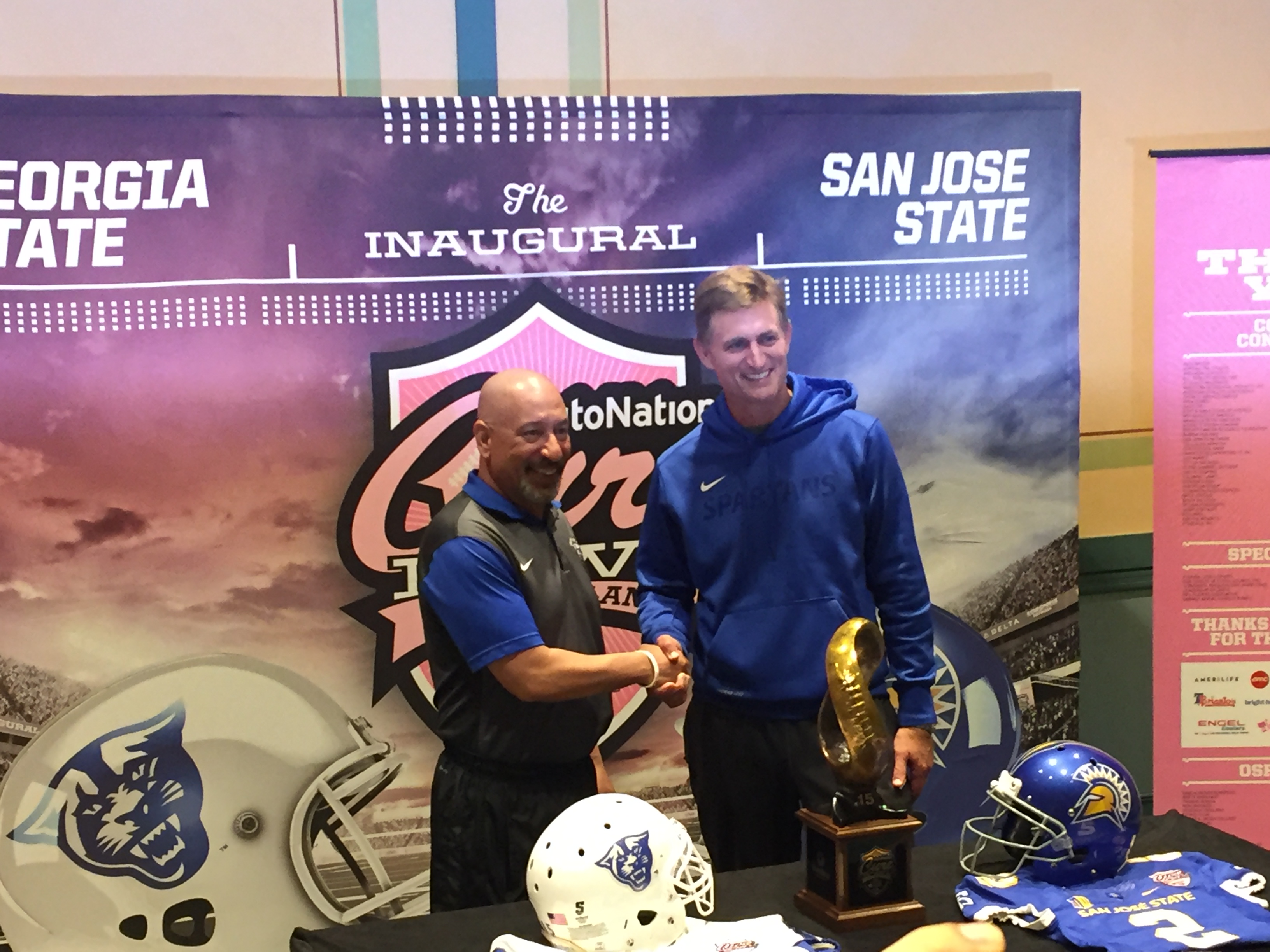
The Cure Bowl always endeavored to be mean something more than just a football game. With the participants in town, they shared what this game truly means.
Cancer has more than likely touched everyone’s life in some way. If it has not, it probably has touched someone everyone knows.
It is extremely personal and extremely challenging. And the fight never ends.
It is as much a challenge for the patients loved ones. There is a powerlessness and loss. Cancer just seems to take.
It took a San Jose State teammate off the team for a while. It took his mother. No college student should have to go through losing a parent. But cancer does not care about that at all. It just takes.
In the wake of the fight, it can bring people together too. It can bring a team together.
For San Jose State, it helped bring them together and rally behind one of their teammates.
“It was everything,” Spartans safety Simon Connette said. “During that time, I got countless phone calls every single day from coaches – coach [Ron] Caragher and Donte Williams, my position coach. I got countless cards from players.
“It is actually a cool little story. Christian Tago our linebacker on one of the cards he sent me was this year is for Mother Connette. As it turns out, we are in the Cure Bowl. It is kind of ironic at how it worked out. It was huge to have all the support. The first day that I walked back into the locker room I could barely keep the tears inside. Everyone is just giving me hugs and says that they are praying for me. It was really cool to feel that a part from my family, I had another Spartan family. It was awesome.”
Connette lost his mother to breast cancer last spring. He took some time away from the team before finding the support and love of his teammates. This season would be for her.
Then the news came that All-American punter Michael Carrizosa’s mother was having her own battle with breast cancer. Connette became a valuable teammate and friend to lean on and help him get through the conflicting feelings — sadness, anger, frustration, hope, despair — that comes with battling such a brutal disease.
He said he tried to give advice and help to Carrizosa as he dealt with his mom’s diagnosis.
The entire team rallied around their hurting brothers throughout the season.
The Spartans went 5-7 and seemed destined to miss a bowl game. Things began to break for them with not enough teams reaching six wins and bowl eligibility. And then Missouri declined a bowl invitation at 5-7, opening the door for San Jose State.
The Spartans would have to travel cross-country, but even members of the team knew this was the bowl game they were destined to play in.
“It is very ironic that we are playing in the Cure Bowl,” San Jose State coach Ron Carragher said. “It just hits home. If I asked everyone in the room to raise their hand if they have been effected by cancer, everyone would probably raise their hand. When it’s your mom, it really hits home – the person who raised you and brought you up. The team has really come together and it is really conclusive that we can finish our season playing in the Cure Bowl with what our team has been through.”
The Cure Bowl always endeavored to be different.
When the bowl committee was initially formed in 2007, the idea was to put together a bowl game that would benefit a charitable cause in a direct way. Almost every bowl game donates its profits to a charity. But rarely is that charity front and center as its cause.
The Cure Bowl from its inception was going to be about raising awareness and donating its profits to research to cure breast cancer. The pink that would surround the Orlando Citrus Bowl on Saturday would be more than just a promise, it was a mission statement.
The teams invited to play in the game have come to embody that mission and accept it fully, hoping that their little game can raise more awareness for the fight they are continuing.
“One of the things that we talk about is who are we playing for,” Georgia State coach Trent Miles said. “There’s always a bigger power than just you. Playing in a game like this, for a cause like this is bigger than us. It touches a lot of people. If we go out there and we have a great performance, it could open up a lot of people’s eyes. Hopefully people realize that we need to start doing something about getting a cure and doing all you can to support it.”
Miles himself has had to fight cancer in his family. His father died of prostate cancer and his mother is currently fighting breast cancer. She will be flying in for the game.
These kinds of stories are not uncommon. Cancer seems to touch everyone at some point in their lives. It seems to run in families. And while there are treatments to fight it and guides to avoid it, it is not something that ever seems to go away.
Cancer is a specter hanging over entire families. Eventually it strikes. And that is why continuing to build awareness and funds to research a cure become so important.
Georgia State linebacker Joseph Peterson noted that this is not something that is talked about enough. Even with all the awareness — Susan G. Komen races for the cure or the NFL donning pink for October’s Breast Cancer Awareness Month — there is still something of a lack of conversation. Especially among men.
And even if it is ubiquitous, what is one more word to the conversation?
This is not a fight fought by a few, but a fight fought by everyone.
If the Cure Bowl can unite even a few more people to tackle this fight or raise that extra cent, then the bowl game will have served its purpose.
When Carragher first spoke to his San Jose State about attending this game, the purpose of the bowl became one his group could rally behind. It made the cross-country trip for this small program well worth it.
If 60 minutes of football can distract a breast cancer patient, raise some money or bring awareness, the result will not matter as much. It is important to be part of the message and part of the cure.
“Obviously going through what my family and I have gone through, it really means a lot coming to this bowl game because of the significance of its message – finding a cure for cancer, which has affected so many people,” Connette said. “Just to be a part of this and knowing that it is supporting such a good cause, really means a lot to me because I don’t want anyone to feel what I and my family have to feel.”

















